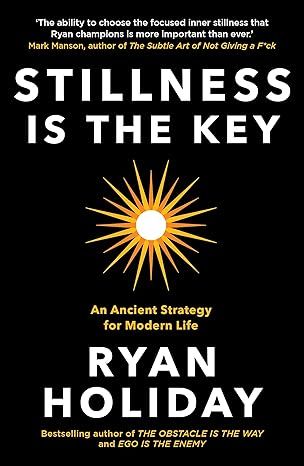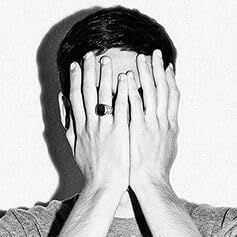Stillness is the Key: An Ancient Strategy for Modern Life
4.7
-
9,966 ratings
Throughout history, there has been one quality that great leaders, makers, artists and fighters have shared. The Zen Buddhists described it as inner peace, the Stoics called it ataraxia and Ryan Holiday calls it stillness: the ability to be steady, focused and calm in a constantly busy world.
Drawing on a wide range of history's greatest thinkers, Holiday shows us how crucial stillness is, and how it can be cultivated in our own lives today. Just as Winston Churchill, Oprah Winfrey and baseball player Sadaharu Oh have done, we can all benefit from stillness to feed into our greater ambitions - whether building a business or simply finding happiness, peace and self-direction.
Stillness is the key to the self-mastery, discipline and focus necessary to succeed in this competitive, noisy world.
Kindle
$8.99
Available instantly
Audiobook
$0.00
with membership trial
Hardcover
$14.39
Paperback
$12.59
Ships from
Amazon.com
Payment
Secure transaction
ISBN-10
1788162064
ISBN-13
978-1788162067
Print length
288 pages
Language
English
Publisher
Profile Books
Publication date
October 07, 2020
Dimensions
5.08 x 0.79 x 7.8 inches
Item weight
9.1 ounces
Popular Highlights in this book
The less energy we waste regretting the past or worrying about the future, the more energy we will have for what’s in front of us.
Highlighted by 7,863 Kindle readers
To be steady while the world spins around you. To act without frenzy. To hear only what needs to be heard. To possess quietude—exterior and interior—on command.
Highlighted by 6,535 Kindle readers
Weigh advice against the counsel of our convictions. Deliberate without being paralyzed.
Highlighted by 5,486 Kindle readers
Give more. Give what you didn’t get. Love more. Drop the old story.
Highlighted by 5,122 Kindle readers
Product details
ASIN :
B07MJ3TDCZ
File size :
23704 KB
Text-to-speech :
Enabled
Screen reader :
Supported
Enhanced typesetting :
Enabled
X-Ray :
Enabled
Word wise :
Enabled
Editorial Reviews
“In this age of manufactured outrage and constant distraction, the ability to choose a focused inner stillness is arguably more important than ever before. Ryan Holiday’s book revives ancient wisdom that calls for a quiet life in a noisy and restless world.” —Mark Manson, #1 bestselling author of The Subtle Art of Not Giving a F*ck
"The next Malcolm Gladwell. Ryan Holiday's just brilliant." —Lance Armstrong
“Whether you are an athlete, an investor, a writer or an entrepreneur, this little but wise and soulful book will open the door to a healthier, less anxious and more productive life and career.” —Arianna Huffington
“Some authors give advice. Ryan Holiday distills wisdom. This book is a must read for anyone feeling overwhelmed by the frenetic demands of modern life." —Cal Newport, New York Times bestselling author of Digital Minimalism
“Don’t be fooled. Within the pages of this unassuming little book lie a life-changing idea: that in order to move forward, we must learn to be still. Ryan Holiday has done it again.” —Sophia Amoruso, Co-Founder & CEO, Girlboss
“This short and entertaining book provides useful tools and captivating examples on how to keep a healthy, clutter-free and productive mind. —Manu Ginobili, four time NBA champion and Olympic Gold Medalist
"Ryan Holiday is among the most psychologically wise writers I know. I'm a fan of all of his work, including this new gem, Stillness is the Key. If you struggle—as I do—to find your center in the increasingly noisy and frenetic world we live in, then this book is for you." —Angela Duckworth, bestselling author of Grit
“In the world today the dangers are many—most notably, the endless distractions and petty battles that make us act without purpose or direction. In this book, through his masterful synthesis of Eastern and Western philosophy, Ryan Holiday teaches us all how to maintain our focus and presence of mind amid the sometimes overwhelming conflicts and troubles of 21st-century life.” —Robert Greene
“Ryan Holiday is one of the brilliant writers and minds of our time. In Stillness is the Key he gives us the blueprint to clear our minds, recharge our souls and reclaim our power.” —Jon Gordon, author of The Energy Bus
“Highly recommended. Great read.” —CJ McCollum, Portland Trailblazers
"Ryan Holiday is a national treasure and a master in the field of self-mastery. In his most compelling book yet, he has mined both the classical literature of the ancient world and cultural touchstones from Mister Rogers to Tiger Woods, and brought his learnings to us in terms that the frantic, distracted, over-caffeinated modern mind can understand and put to use. Highly recommended." —Steven Pressfield, bestselling author of The War of Art and The Artist's Journey
“A timely, vividly realized reminder to slow down and harness the restorative wonders of serenity.” —Kirkus Reviews
Read more
Sample
The Domain of the Mind
The entire world changed in the few short hours between when John F. Kennedy went to bed on October 15, 1962, and when he woke up the following morning.
Because while the president slept, the CIA identified the ongoing construction of medium- and long-range Soviet ballistic nuclear missile sites on the island of Cuba, just ninety miles from American shores. As Kennedy would tell a stunned American public days later, "Each of these missiles is capable of striking Washington, D.C., the Panama Canal, Cape Canaveral, Mexico City, or any other city in the southeastern part of the United States, in Central America, or in the Caribbean."
As Kennedy received his first briefing on what we now know as the Cuban Missile Crisis-or simply as the Thirteen Days-the president could consider only the appalling stakes. As many as seventy million people were expected to die in the first strikes between the United States and Russia. But that was just a guess-no one actually knew how terrible nuclear war would be.
What Kennedy knew for certain was that he faced an unprecedented escalation of the long-brewing Cold War between the United States and the USSR. And whatever factors had contributed to its creation, no matter how inevitable war must have appeared, it fell on him, at the very least, to just not make things worse. Because it might mean the end of life on planet Earth.
Kennedy was a young president born into immense privilege, raised by an aggressive father who hated to lose, in a family whose motto, they joked, was "Don't Get Mad, Get Even." With almost no executive leadership experience under his belt, it's not a surprise, then, that the first year and half of Kennedy's administration had not gone well.
In April 1961, Kennedy had tried and failed-embarrassingly so-to invade Cuba and overthrow Fidel Castro at the Bay of Pigs. Just a few months later, he was diplomatically dominated by Soviet premier Nikita Khrushchev in a series of meetings in Vienna. (Kennedy would call it the "roughest thing in my life.") Sensing his adversary's political weakness, and likely aware of the chronic physical frailty he endured from Addison's disease and back injuries suffered during World War II, Khrushchev repeatedly lied to Kennedy about any weapons being placed in Cuba, insisting that they would be for defensive purposes only.
Which is to say that Kennedy faced, as every leader will at some point in their tenure, a difficult crisis amid complicating personal and political circumstances. There were many questions: Why would Khrushchev do this? What was his endgame? What was the man possibly trying to accomplish? Was there a way to solve it? What did Kennedy's advisors think? What were Kennedy's options? Was he up to this task? Did he have what it took?
The fate of millions depended on his answers.
The advice from Kennedy's advisors was immediate and emphatic: The missile sites must be destroyed with the full might of the country's military arsenal. Every second wasted risked the safety and the reputation of the United States. After the surprise attack on the missiles, a full-scale invasion of Cuba by American troops would need to follow. This, they said, was not only more than justified by the actions of the USSR and Cuba, but it was Kennedy's only option.
Their logic was both primal and satisfying: Aggression must be met with aggression.
Tit replied to with tat.
The only problem was that if their logic turned out to be wrong, no one would be around to account for their mistake. Because everyone would be dead.
Unlike in the early days of his presidency, when Kennedy allowed the CIA to pressure him into supporting the Bay of Pigs fiasco, this time he surprised everyone by pushing back. He had recently read Barbara Tuchman's The Guns of August, a book about the beginning of World War I, which imprinted on his mind the image of overconfident world leaders rushing their way into a conflict that, once started, they couldn't stop. Kennedy wanted everyone to slow down so that they could really think about the problem in front of them.
This is, in fact, the first obligation of a leader and a decision maker. Our job is not to "go with our gut" or fixate on the first impression we form about an issue. No, we need to be strong enough to resist thinking that is too neat, too plausible, and therefore almost always wrong. Because if the leader can't take the time to develop a clear sense of the bigger picture, who will? If the leader isn't thinking through all the way to the end, who is?
We can see in Kennedy's handwritten notes taken during the crisis, a sort of meditative process by which he tried to do precisely this. On numerous pages, he writes "Missile. Missile. Missile," or "Veto. Veto. Veto. Veto," or "Leaders. Leaders. Leaders." On one page, showing his desire to not act alone or selfishly: "Consensus. Consensus. Consensus. Consensus. Consensus. Consensus." On a yellow legal pad during one meeting, Kennedy drew two sailboats, calming himself with thoughts of the ocean he loved so much. Finally, on White House stationery, as if to clarify to himself the only thing that mattered, he wrote one short sentence: "We are demanding withdrawal of the missiles."
Perhaps it was there, as Kennedy sat with his advisors and doodled, that he remembered a passage from another book he'd read, by the strategist B. H. Liddell Hart, on nuclear strategy. In Kennedy's review of Hart's book for the Saturday Review of Literature a few years before, he quoted this passage:
Keep strong, if possible. In any case, keep cool. Have unlimited patience. Never corner an opponent, and always assist him to save face. Put yourself in his shoes-so as to see things through his eyes. Avoid self-righteousness like the devil-nothing is so self-blinding.
It became Kennedy's motto during the Missile Crisis. "I think we ought to think of why the Russians did this," he told his advisors. What is the advantage they are trying to get? he asked, with real interest. "Must be some major reason for the Soviets to set this up." As Arthur Schlesinger Jr., Kennedy's advisor and biographer, wrote, "With his capacity to understand the problems of others, the President could see how threatening the world might have looked to the Kremlin."
This understanding would help him respond properly to this unexpected and dangerous provocation-and give him insight into how the Soviets would react to that response.
It became clear to Kennedy that Khrushchev put the missiles in Cuba because he believed Kennedy was weak. But that didn't mean the Russians believed their own position was particularly strong. Only a desperate nation would take such a risk, Kennedy realized. Armed with this insight, which came through long discussions with his team-designated as ExComm-he began to formulate an action plan.
Clearly, a military strike was the most irrevocable of all the options (nor, according to his advisors, was it likely to be 100 percent effective). What would happen after that, Kennedy wondered? How many soldiers would die in an invasion? How would the world respond to a larger country invading a smaller one, even if it was to deter a nuclear threat? What would the Russians do to save face or protect their soldiers on the island?
These questions pointed Kennedy toward a blockade of Cuba. Nearly half of his advisors opposed this less aggressive move, but he favored it precisely because it preserved his options.
It also embodied the wisdom of one of Kennedy's favorite expressions: A blockade used time as a tool. It gave both sides a chance to examine the stakes of the crisis and offered Khrushchev the opportunity to reevaluate his impression of Kennedy's supposed weakness.
Some would later attack Kennedy for this choice, too. Why challenge Russia at all? Why were the missiles such a big deal? Didn't the United States have plenty of their own pointed at the Soviets? Kennedy was not unsympathetic to this argument, but as he explained to the American public in an address on October 22, it wasn't possible to simply back down:
The 1930s taught us a clear lesson: Aggressive conduct, if allowed to go unchecked and unchallenged, ultimately leads to war. This nation is opposed to war. We are also true to our word. Our unswerving objective, therefore, must be to prevent the use of these missiles against this or any other country, and to secure their withdrawal or elimination from the Western Hemisphere. . . . We will not prematurely or unnecessarily risk the costs of worldwide nuclear war in which even the fruits of victory would be ashes in our mouth-but neither will we shrink from that risk at any time it must be faced.
What's most remarkable about this conclusion is how calmly Kennedy came to it. Despite the enormous stress of the situation, we can hear in tapes and see in transcripts and photos taken at the time just how collaborative and open everyone was. No fighting, no raised voices. No finger-pointing (and when things did get tense, Kennedy laughed it off). Kennedy didn't let his own ego dominate the discussions, nor did he allow anyone else's to. When he sensed that his presence was stifling his advisors' ability to speak honestly, he left the room so they could debate and brainstorm freely. Reaching across party lines and past rivalries, he consulted openly with the three still-living ex-presidents and invited the previous secretary of state, Dean Acheson, into the top-secret meetings as an equal.
In the tensest moments, Kennedy sought solitude in the White House Rose Garden (afterward, he would thank the gardener for her important contributions during the crisis). He would go for long swims, both to clear his mind and to think. He sat in his specially made rocking chair in the Oval Office, bathed in the light of those enormous windows, easing the pain in his back so that it might not add to the fog of (cold) war that had descended so thickly over Washington and Moscow.
There is a picture of Kennedy with his back to the room, hunched over, leaning both fists on the big desk he had been chosen by millions of voters to occupy. This is a man with the fate of the world on his shoulders. He has been provoked by a nuclear superpower in a surprise act of bad faith. Critics are questioning his courage. There are political considerations, personal considerations, there are more factors than any one person should be able to weigh at one time.
Yet he lets none of this rush him. None of it will cloud his judgment or deter him from doing the right thing. He is the stillest guy in the room.
Kennedy would need to stay that way, because simply deciding on the blockade was only the first step. Next came announcing and enforcing this five-hundred-mile no-go zone around Cuba (which he brilliantly called a "quarantine" to underplay the more aggressive implications of a "blockade"). There would be more belligerent accusations from the Russians and confrontations at the UN. Congressional leaders voiced their doubts. One hundred thousand troops still had to be readied in Florida as a contingency.
Then there would be the actual provocations. A Russian tanker ship approached the quarantine line. Russian submarines surfaced. An American U-2 spy plane was shot down over Cuba, and the pilot killed.
The two biggest and most powerful countries in the world were "eyeball to eyeball." It was actually scarier and more dire than anyone knew-some of the Soviet missiles, which had been previously thought to be only partly assembled, were armed and ready. Even if this wasn't known, the awful danger could be felt.
Would Kennedy's emotions get the best of him? Would he blink? Would he break?
No. He wouldn't.
"It isn't the first step that concerns me," he said to his advisors as much as to himself, "but both sides escalating to the fourth and fifth step-and we don't go to the sixth because there is no one around to do so. We must remind ourselves we are embarking on a very hazardous course."
The space Kennedy gave Khrushchev to breathe and think paid off just in time. On October 26, eleven days into the crisis, the Soviet premier wrote Kennedy a letter saying that he now saw that the two of them were pulling on a rope with a knot in the middle-a knot of war. The harder each pulled, the less likely it would be that they could ever untie it, and eventually there would be no choice but to cut the rope with a sword. And then Khrushchev provided an even more vivid analogy, one as true in geopolitics as it is in everyday life: "If people do not display statesmanlike wisdom," he said, "they will eventually reach the point where they will clash, like blind moles, and then mutual annihilation will commence."
Suddenly, the crisis was over as quickly as it began. The Russians, realizing that their position was untenable and that their test of U.S. resolve had failed, made signs that they would negotiate-that they would remove the missiles. The ships stopped dead in the water. Kennedy was ready too. He pledged that the United States would not invade Cuba, giving the Russians and their allies a win. In secret, he also let the Russians know that he was willing to remove American missiles in Turkey, but would do so in several months' time so as not to give the impression that he could be pressured into abandoning an ally.
With clear thinking, wisdom, patience, and a keen eye for the root of a complex, provocative conflict, Kennedy had saved the world from a nuclear holocaust.
We might say that Kennedy, if only for this brief period of a little less than two weeks, managed to achieve that stage of clarity spoken about in the ancient Chinese text The Daodejing. As he stared down nuclear annihilation, he was:
Careful as someone crossing an iced-over stream.
Alert as a warrior in enemy territory.
Courteous as a guest.
Fluid as melting ice.
Shapable as a block of wood.
Receptive as a valley.
Clear as a glass of water.
The Daoists would say that he had stilled the muddied water in his mind until he could see through it. Or to borrow the image from the emperor Marcus Aurelius, the Stoic philosopher who himself had stared down countless crises and challenges, Kennedy had been "like the rock that the waves keep crashing over. It stands, unmoved and the raging of the sea falls still around it."
Each of us will, in our own lives, face crisis. The stakes may be lower, but to us they will matter. A business on the brink of collapse. An acrimonious divorce. A decision about the future of our career. A moment where the whole game depends on us.
These situations will call upon all our mental resources. An emotional, reactive response-an unthinking, half-baked response-will not cut it. Not if we want to get it right. Not if we want to perform at our best.
Read more
About the authors
Ryan Holiday
Ryan Holiday is one of the world's bestselling living philosophers. His books like The Obstacle Is the Way,Ego Is the Enemy,The Daily Stoic, and the #1 New York Times bestseller Stillness Is the Key appear in more than 40 languages and have sold more than 5 million copies. Together, they've spent over 300 weeks on the bestseller lists. He lives outside Austin with his wife and two boys...and a small herd of cows and donkeys and goats. His bookstore, The Painted Porch, sits on historic Main St in Bastrop, Texas.
Read more
Reviews
Customer reviews
4.7 out of 5
9,966 global ratings
Patrick J. Stiles
5
Ryan's Best Book, Truly Life Changing & A Guide On How to Live Life <3
Reviewed in the United States on May 21, 2020
Verified Purchase
This book is unbelievably good. I thought it was going to say -- you should meditate and some basic advice on things I'm already doing or aware of. While he mentions meditation briefly, this book talks about many many different areas of life.
From believing in a higher power to owning material possessions - he covers all the things that really matter.
Like his other books, and something he is soooo good at, he peppers in stories from famous athletes and celebrities to bigger than life historical figures. He draws on lessons from Jesus, Buddha, the 12 steps and (obviously) the stoics. So this isn't just for people who fetishize one school of thought.
Not that it matters to most people, but I also want to mention as someone who's in recovery, that Ryan is spot on with his understanding of the 12 Steps and the fellowships that embody them. This is very rare... But rather he gets the deeper spiritual meaning of things, like being of service.
So while I'm not an expert stoic or buddhist, I trust that he's turned these ancient traditions into a modern day piece of philosophy that is easy to consume and very practical.
And that is just the thing... This book is a book of philosophy written for the 21 century -- where we have smart phones, social media, remote work and globalization. Personally, I've tried to get into the some of the ancient texts on these topics, but I always struggled to really wrap my head around them, since they are written for such a different time with such a different style than modern communication... But not with this.
I'm very excited to see what else he creates in the years to come.
Now that I just finished this book, I'm quite literally going to restart it.
Read more
Amazon Customer
5
Wow
Reviewed in the United States on July 16, 2024
Verified Purchase
Just wow.
Michael J
5
Ryan Holiday's best book so far
Reviewed in the United States on November 24, 2019
Verified Purchase
Ryan Holiday has become something of an expert on Stoic philosophy, and his previous books have mostly focused on that style of thinking. That's great, but I was pleased to see him branch out a bit more in this book.
In this book, he writes about the need for quiet time and reflection, and how important it is in order to be happy and productive. One thing I really liked about this book was how he also gives examples from other schools of thought on the topic of stillness, such as Buddhism and Christianity, as well as Stoic, Cynic, and Epicurean philosophy.
The book is divided into three sections, for Mind, Spirit, and Body. In the "Mind" section, he writes about the need for mindfulness, and being present in the moment. He recommends habits such as journaling, which allow you to commit your thoughts to paper, so that you can empty your mind for thinking about more important topics.
In the "Spirit" section of the book, he talks about how most effective people have a faith of some sort, but he doesn't promote any particular creed or faith. He also talks about cultivating an attitude of virtuous living, and accepting life as it is, and being happy with what you have. This all resonated deeply with me, since for the past several years, my own personal beliefs have tended mostly towards Buddhism.
Finally, in the "Body" section of the book, he talks about the importance of getting enough of both exercise and rest, the benefits of going for long walks, and avoiding "escapism."
For me, reading books like this inspire me to do the things I know that I should be doing. Almost everything in the book is either common sense, or things I already know are useful habits to cultivate. However, Holiday's presentation of them ties them all together and reinforces how important they are, and the book left me feeling committed to trying harder to implement them in my life.
If you're looking for an easy-to-read book that will inspire you to become a better person, this book is worth picking up.
Read more
10 people found this helpful
Tyler Cannon
5
Clear, Concise, and Essential Reading for our Modern Life-- Holiday Kills it Yet Again
Reviewed in the United States on November 5, 2019
Verified Purchase
Ryan Holiday is killing it, and everyone needs to pay attention.
He's killing it for our benefit.
This is a book that dissects ancient scripts and lessons from history, that makes connections and ties ideas and provides keen insights in an easy to understand (and tangibly compact) manner. The idea of "Stillness" seems foreign to most people (even myself), as we can think of some ancient and wise person sitting in a garden with a coy pond, mist hovering just above the ground, chimes sounding in the far distance. The reality is that the idea of "Stillness" come from inside of us all, and it is within our choices to find it, and use it.
Ryan paints this idea masterfully. Here is a book that is small in physical size, but carries immense wisdom. For those who subscribe to his reading list, as well as Daily Stoic and Daily Dad, we see familiar concepts throughout all of his writing, based in Stoicism, but also delves into ancient Eastern philosophy, as well as Western philosophy. As always, Ryan is interested in what will help us to live -and thus die- in the best way possible. Dozens of anecdotes from historical figures (both those whom we admire and those whom serve as a lesson of what not to be) he is instrumental at illustrating these points.
If you're looking for a deep-study, getting into the molecular structure of "Stillness" and philosophy, this is not the place. The chapters are small and digestible four our understanding and our benefit. For something to be profound it doesn't have to be gigantic and full of four-syllable words. This is palatable, easy-to-understand-but-difficult-to-apply type stuff. It requires work. It's a challenge. It's also okay to disagree with what he writes, as long as it prompts the reader to seek the right answer (if only for themselves) to live better.
This is (another one of) Ryan's gift to the world, and we are all better off having read it. I know I am.
Read more
Gymbeaux
5
Another Holiday Must Read!
Reviewed in the United States on December 20, 2020
Verified Purchase
This is the fourth Ryan Holiday book I have read. The other three were Ego is the Enemy, The Obstacle is the Way, and Conspiracy. Like those three books, this book is an excellent read as well. I especially like the way in which Holiday writes. He makes his points using historical figures and events to do so and his writing style is easy to read and understand.
Disclaimer. I am well aware of how many people who should know about such things recommend that people SHOULD engage in stillness or meditation. I have tried and have failed primarily because when I attempt at stillness and quietness, my head wants to explode because of the long-time suffering from Tinnitus, the ringing in my head that never ceases and is enhanced whenever I am in total silence. It is very depressing to say the least. Yet even for me, this book is God-sent because it reinforces a life you would want to live by. It is extremely difficult for me to imagine someone reading this book and not improving their outlook on life. It is that good.
That aside, I still found Holiday’s book fascinating. The following quote from book explains why YOU should read it as well as anyone who you value in life: “Confucius and his followers spoke constantly of the cultivation of wisdom, saying that it is achieved in the same way that a craftsman develops skill: by putting in the time.” Everyone could benefit from reading this book but I would suggest that everyone over the age of four should at least read the chapter titled Limit Your Inputs. Holiday is so very much on target and when you read just this one chapter you KNOW that he is and you can probably see yourself in the people he describes and trust me, that is NOT a good thing.
Holiday’s book is a well written “how to” book on creating a better life not only for you but also for the people that surround you that you love and who love you. A quote from the book is right on point when it comes to defining the value of maintaining a personal journal: “That is what journaling is about. It’s spiritual windshield wipers, as the writer Julia Cameron once put it.”
Who should read this book? From the book: “People who don’t read have no advantage over those who cannot read.” If YOU read this book and just practice some of Holiday’s advice, your life would be a better for having read it. If two read it, double the results. But if an entire country were to read and practice its lessons, the world would truly be a better place to live for eternity! Everyone should read and practice this book.
Would I read it again? There would be no need, except to locate specific quotes from people throughout history that you may want to use.
Would I give it as a gift? ABSOLUTELY!
Read more
36 people found this helpful
Top Ryan Holiday titles
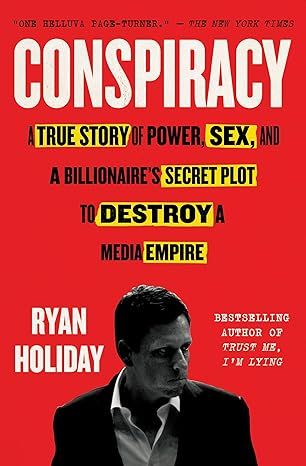
Conspiracy: A True Story of Power, Sex, and a Billionaire's Secret Plot to Destroy a Media Empire
4.3
-
1,965
$5.99
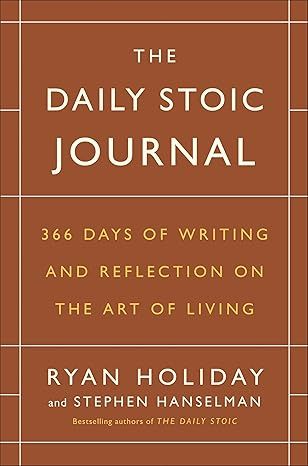
The Daily Stoic Journal: 366 Days of Writing and Reflection on the Art of Living
4.7
-
2,537
$15.99
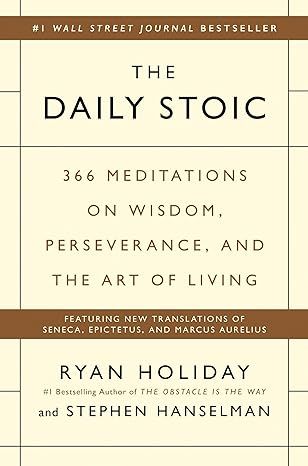
The Daily Stoic: 366 Meditations on Wisdom, Perseverance, and the Art of Living
4.8
-
32,641
$13.00
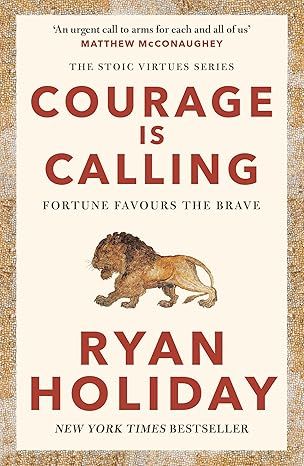
Courage Is Calling
4.6
-
4,763
$13.35
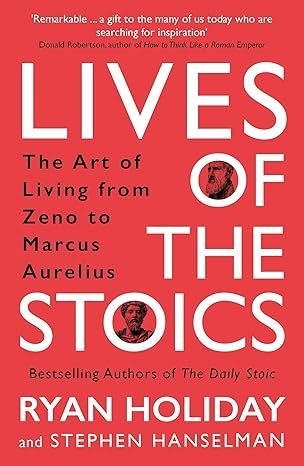
Lives of the Stoics: The Art of Living from Zeno to Marcus Aurelius
4.7
-
2,858
$8.99
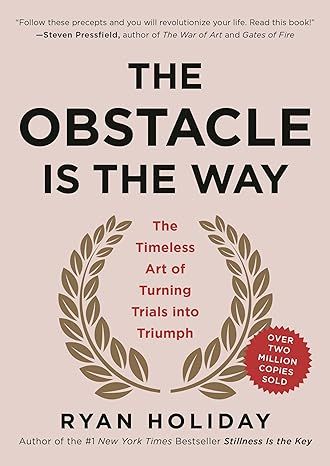
The Obstacle Is the Way: The Timeless Art of Turning Trials into Triumph
4.6
-
28,125
$4.99
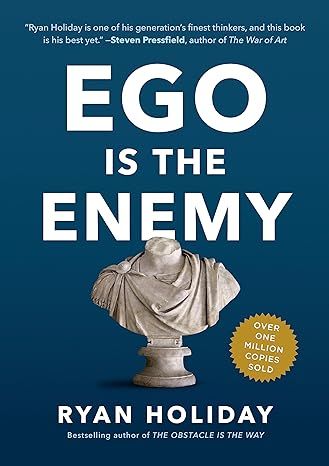
Ego is the Enemy: The Fight to Master Our Greatest Opponent
4.6
-
20,573
$11.99
Best Sellers

The Tuscan Child
4.2
-
100,022
$8.39

The Thursday Murder Club: A Novel (A Thursday Murder Club Mystery)
4.3
-
155,575
$6.33

Sapiens: A Brief History of Humankind
4.6
-
140,302
$13.49

The Butterfly Garden (The Collector, 1)
4.3
-
88,556
$9.59

Things We Hide from the Light (Knockemout Series, 2)
4.4
-
94,890
$11.66

The Last Thing He Told Me: A Novel
4.3
-
154,085
$2.99

The Perfect Marriage: A Completely Gripping Psychological Suspense
4.3
-
143,196
$9.47

The Coworker
4.1
-
80,003
$13.48

First Lie Wins: A Novel (Random House Large Print)
4.3
-
54,062
$14.99

Mile High (Windy City Series Book 1)
4.4
-
59,745
$16.19

Layla
4.2
-
107,613
$8.99

The Locked Door
4.4
-
94,673
$8.53
